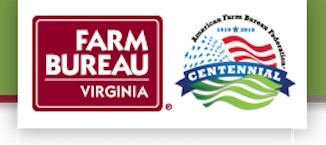
~ Press release issued by Virginia Farm Bureau Federation on April 9
RICHMOND — From supply chain interruptions to slowed revenue streams, farmers are facing a myriad of challenges caused by the coronavirus pandemic.
Markets that were previously profitable are now pinched as businesses and organizations modify their operations to comply with guidelines to stem the spread of COVID-19.
“A lot of our produce is wholesale, and we provide to wholesale markets,” said Kari Sponaugle, a Highland County farmer and Virginia Cooperative Extension 4-H agent who owns Church Hill Produce with her husband, Michael. “But a lot of our wholesalers were selling to cafeterias and to restaurants.”
Those businesses have changed dramatically in a short time.
“We’re being faced with how to sell our produce and what that’s going to look like for the future,” Sponaugle said.
To adapt to market and production changes, farmers, farming organizations and advocacy groups are uniting to network and share ideas on how to adjust their business practices while complying with executive orders and restrictions.
“We’ve been working with farmers and farmers markets entering e-commerce for the first time in order to facilitate direct-to-consumer sales,” said Tony Banks, senior assistant director of agriculture, development and innovation for Virginia Farm Bureau Federation. “Farmers who have traditionally relied on in-person sales for their production are being forced to go online.”
Software platforms like Lulus Local Food provide opportunities for farmers to sell online to customers. Many also are participating in drive-through farmers markets and on-farm pickups so customers can place orders in advance and pick up their purchases without leaving their vehicles. The aim is to make things convenient and accessible for consumers while maintaining social distance.
In addition to quickly adapting to new ways of conducting business, farmers are facing significant price decreases for cattle, milk and grains.
“This is very discouraging for them when they see sold out or depleted sections of food at their grocer,” Banks noted. “It’s not that the food system has run out; school and restaurant closures and consumer panic-buying have created disruptions in the supply chain, requiring processors to shift product lines and distribution.”
The pandemic also adds an additional layer of uncertainty to agricultural commodity markets and an anticipated resumption of trade among the U.S., Canada, China and Mexico, Banks said.
Some farmers may get some financial help from the recently passed Coronavirus Aid, Relief and Economic Security Act. Farmers are encouraged to check the websites of the U.S. Department of Agriculture and Small Business Administration, or contact a local USDA service center to see if they qualify for assistance.
For the latest farmer-relevant information on to COVID-19, visit Farm Bureau’s farmer resources webpage.



Be the first to comment